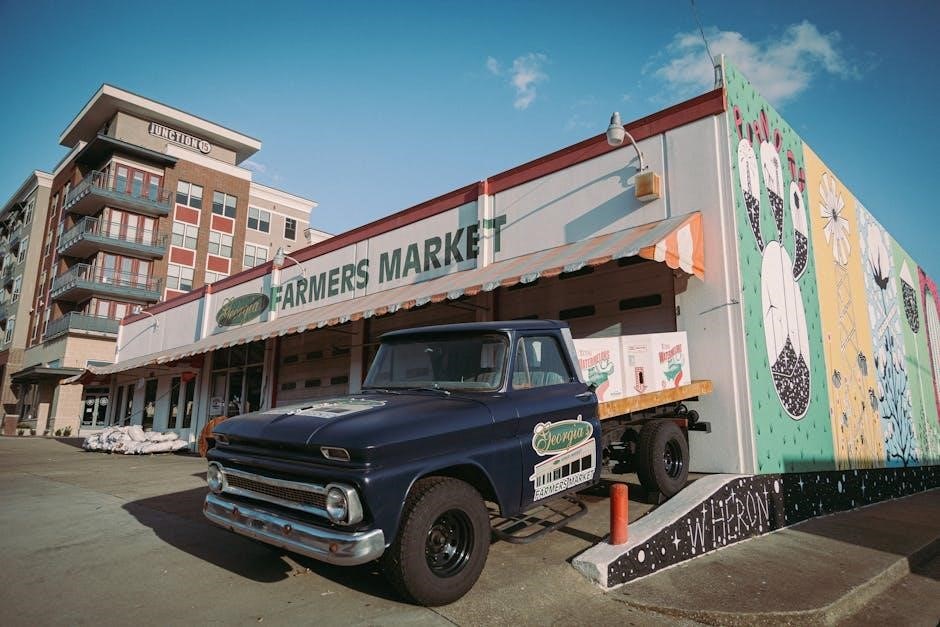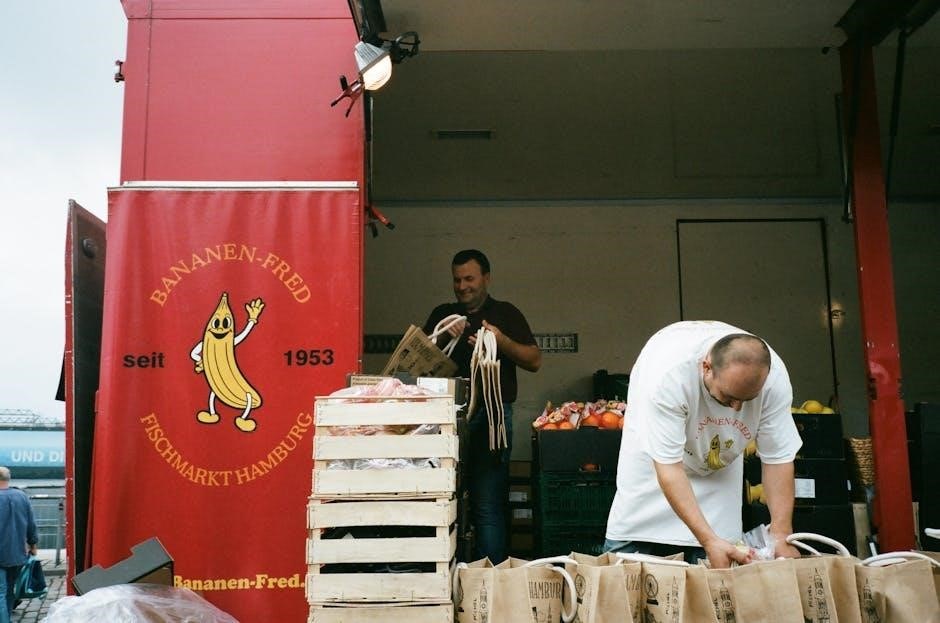
food truck business plan sample pdf
Executive Summary
Tasty Wheels, a new food truck venture, offers authentic street cuisine with a focus on quality and freshness․ Our vision is to become the top choice for food lovers, while our mission is to deliver exceptional taste and service․ We aim to secure $50,000 in funding to purchase the truck and cover initial operational costs․
1․1․ Business Overview
Tasty Wheels is a mobile food truck concept specializing in authentic street cuisine with a modern twist․ Our menu features diverse, locally-sourced dishes, catering to a broad audience, including health-conscious and adventurous eaters․ The truck will operate at popular events, festivals, and high-traffic urban locations․ We emphasize quality ingredients, unique flavors, and eco-friendly packaging․ Our goal is to create a memorable dining experience while building a loyal customer base․ This overview outlines our core concept, menu highlights, and operational strategy to position Tasty Wheels as a standout in the competitive food truck industry․
1․2․ Vision and Mission
Our vision is to become the leading food truck in the city, recognized for our innovative menu and exceptional customer service․ We aim to revolutionize street food by blending traditional flavors with modern twists, ensuring every bite is memorable․ Our mission is to deliver high-quality, affordable dishes using fresh, locally-sourced ingredients while fostering a positive community impact through sustainable practices․ We strive to create a welcoming environment that connects people through food, making Tasty Wheels a beloved destination for food enthusiasts․
1․3․ Objectives
Our primary objective is to establish Tasty Wheels as a premier food truck brand within the first year․ We aim to achieve consistent customer satisfaction ratings above 90% and increase our daily serving capacity by 20% quarterly․ Financially, we target a revenue growth of $10,000 monthly within six months and achieve profitability by the end of year one․ Additionally, we plan to expand our menu seasonally and participate in at least two major food festivals annually․ Building a strong online presence through social media engagement is also a key objective to drive customer loyalty and brand awareness․

Company Description
Tasty Wheels is a limited liability company specializing in gourmet street food․ Owned by experienced chefs, we operate from a fully equipped truck in central locations․
2․1․ Business Structure
Tasty Wheels operates as a limited liability company (LLC), ensuring liability protection and tax efficiency․ The ownership is shared between two experienced chefs, each contributing unique culinary expertise․ The management team includes a head chef, operations manager, and marketing specialist, overseeing daily functions․ The structure is flat, enabling quick decision-making and adaptability․ Key roles are clearly defined to maintain efficiency, with the owners overseeing strategic direction․ This setup allows for streamlined operations and scalability as the business grows․ An advisory board of industry experts provides guidance, ensuring the company stays competitive and aligned with market demands․
2․2․ Ownership Details
Tasty Wheels is owned by two experienced culinary entrepreneurs, John Smith and Sarah Johnson, who collectively hold 100% equity․ John, a skilled chef, owns 60%, while Sarah, a marketing expert, owns 40%․ Both owners are actively involved in operations, with John overseeing the culinary direction and Sarah managing branding and customer relations․ The LLC structure protects personal assets while allowing for shared decision-making․ Initial investments total $30,000, with John contributing $18,000 and Sarah $12,000․ Additional funding is secured through a small business loan․ Ownership stakes are expected to remain unchanged for the first three years of operation․
2․3․ Location and Equipment
Tasty Wheels will operate primarily in downtown areas, near business districts, and at popular event spaces to maximize visibility and foot traffic․ The food truck is fully equipped with a commercial-grade kitchen, including a fryer, grill, refrigerator, and point-of-sale system․ The truck is customized to ensure efficiency, with a layout designed for quick service․ Key equipment includes a generator, cooking appliances, and storage solutions․ The truck is also fitted with solar panels to reduce energy costs․ Strategically located in high-demand areas, Tasty Wheels aims to serve diverse crowds while maintaining operational efficiency and sustainability․
2․4․ Team and Management
Tasty Wheels is led by founder and CEO, Alex Carter, a culinary expert with 10 years of experience in the food industry․ The team includes a head chef, a marketing specialist, and two customer service representatives․ Together, they bring expertise in menu development, operational efficiency, and customer engagement․ The management structure is streamlined to ensure smooth daily operations, with clear roles and responsibilities․ The team is committed to delivering high-quality food and exceptional service, ensuring customer satisfaction and loyalty․ Additionally, an advisory board of industry professionals provides strategic guidance to support the truck’s success and growth in the competitive market․

Market Analysis
Street food popularity is rising globally, with consumers favoring affordable, unique cuisine․ The demand for mobile food services is growing, especially in urban areas with busy professionals seeking convenient meal options․
3․1․ Industry Overview
The food truck industry has experienced significant growth, driven by increasing demand for convenient, affordable, and diverse dining options․ Urban areas with high foot traffic, such as festivals, events, and business districts, present prime opportunities․ The sector is characterized by low entry barriers compared to traditional restaurants, making it accessible for entrepreneurs․ However, competition is intensifying, necessitating unique concepts and superior quality to stand out․ Mobile eateries are also leveraging technology, like online ordering and social media, to enhance customer engagement and operational efficiency․
3․2․ Target Market
Our primary target market includes young professionals, students, and families seeking affordable, high-quality meals․ Urban areas with high foot traffic, such as downtown business districts, universities, and event locations, are key focal points․ Foodies interested in diverse and unique cuisines also represent a significant segment․ Additionally, corporate events and festivals provide opportunities to cater to large, diverse groups․ By strategically positioning our truck in these areas, we aim to capture a loyal customer base and establish ourselves as a go-to option for convenient and satisfying dining experiences․
3․3․ Competitive Analysis
The food truck industry is highly competitive, with numerous established players offering diverse cuisines․ Key competitors include Donnys Food Truck and Holey Moley, known for their unique flavors and strategic locations․ Tasty Wheels differentiates itself by focusing on premium ingredients, customizable menu options, and exceptional customer service․ Our commitment to sustainability and community engagement further sets us apart․ By targeting underserved areas and offering flexible pricing, we aim to capture market share and build a loyal customer base․ Continuous innovation in menu offerings and service delivery will ensure we remain competitive in this dynamic market․

Menu Planning
Tasty Wheels offers a diverse menu featuring fusion, gourmet, and classic street food options, catering to various dietary preferences․ Signature dishes, sides, and desserts are crafted with fresh ingredients․
4․1․ Menu Development
Our menu development focuses on creating a unique fusion of flavors, blending gourmet and street food concepts․ We emphasize fresh, locally-sourced ingredients to ensure quality and sustainability․ Seasonal dishes are incorporated to cater to diverse tastes and preferences․ The menu is designed to be flexible, allowing for customization and dietary accommodations․ Pricing is competitive, with a range of options to appeal to various customer segments․ Regular updates to the menu ensure innovation and keep offerings exciting․ Digital menu boards will be used to showcase items dynamically, enhancing customer engagement and streamline ordering processes․
4․2․ Pricing Strategy
Our pricing strategy is designed to balance affordability and profitability, ensuring accessibility to a broad customer base․ Menu items are competitively priced, with most dishes ranging between $8 and $12․ Value combos and discounts for bulk orders are offered to attract larger groups․ Premium items, such as specialty meats or organic options, are priced slightly higher to reflect their quality․ We also implement a loyalty program, offering discounts after a certain number of purchases․ This approach ensures customer satisfaction while maintaining healthy profit margins․ Dynamic pricing may be applied during peak hours or high-demand events to maximize revenue․
4․3․ Sample Menu
Our sample menu offers a variety of flavorful dishes, including the Classic Cheeseburger ($10), Crispy Chicken Tenders ($9), and Veggie Delight Wrap ($8)․ Specialty items like Spicy Fish Tacos ($12) and BBQ Pulled Pork Sandwich ($11) cater to diverse tastes․ Sides include Golden Fries ($4) and Coleslaw ($3)․ Desserts feature Churros ($5) and Fresh Fruit Salad ($6)․ Beverages range from soft drinks ($3) to iced tea ($2)․ Combo meals are available, offering a main item, side, and drink for $14․ This menu is designed to appeal to a wide audience while maintaining quality and affordability․

Marketing and Sales Strategy
We will leverage branding, social media, and local events to attract customers․ Promotions, discounts, and strategic parking locations will drive sales and build customer loyalty effectively․
5․1․ Branding and Identity
Our branding focuses on creating a vibrant and memorable identity, reflecting the uniqueness of our menu․ A colorful, modern logo and truck design will capture attention․ Consistent messaging emphasizes freshness and quality․ Social media engagement and community involvement will strengthen our connection with customers, building loyalty and recognition; Uniforms and packaging will align with our brand theme, ensuring a cohesive visual experience․ By establishing a strong brand presence, we aim to stand out in the competitive market and resonate with our target audience effectively․
5․2․ Marketing Channels
To reach our target audience effectively, we will utilize a mix of digital and traditional marketing strategies․ Social media platforms like Instagram and Facebook will showcase our menu, behind-the-scenes stories, and customer experiences․ Email marketing will keep subscribers informed about promotions and events․ Collaborations with local influencers and bloggers will enhance credibility and visibility․ Flyers and posters in high-traffic areas will attract passersby․ We will also leverage online ordering and delivery platforms to expand our reach․ Regular participation in food festivals and events will help build brand awareness and customer loyalty․ A referral program will incentivize customers to bring in new business․
5․3․ Sales Strategy
Our sales strategy focuses on maximizing revenue through upselling, cross-selling, and creating a loyal customer base․ The sales team will be trained to suggest complementary items and specials, enhancing the average ticket size․ A loyalty program will reward repeat customers with discounts and freebies after a set number of purchases․ We will also offer limited-time promotions during peak hours to boost sales․ Cashless payment options and digital ordering will streamline transactions, reducing wait times․ Seasonal menu items and themed days will attract new customers and keep the offering fresh․ Sales data will be tracked to identify trends and optimize offerings․

Operational Plan
The food truck will operate 5 days a week, with a focus on high-traffic locations․ The truck will be fully equipped with necessary cooking gear․
6․1․ Daily Operations
Daily operations will begin with location scouting and setup․ The team will purchase fresh ingredients, prepare menu items, and ensure all equipment is functional․ Peak hours will focus on efficient service, maintaining hygiene, and managing orders․ Staff will handle cashless payments and customer interactions․ After service, the truck will return to the commissary for cleaning and restocking․ Waste disposal and equipment maintenance will be prioritized to ensure compliance with health standards․ The team will review daily performance, addressing any issues to optimize future operations and enhance customer satisfaction․
6․2․ Supply Chain Management
Supply chain management will ensure consistent access to high-quality ingredients․ We will establish relationships with reliable local suppliers to source fresh produce, meats, and specialty items․ Orders will be placed bi-weekly, with deliveries scheduled to maintain inventory levels․ Perishable items will be restocked daily to guarantee freshness․ Non-perishables will be stored in a designated commissary․ Inventory management software will track stock levels, reducing waste and overordering․ Backup suppliers will be identified to mitigate disruptions․ This system ensures seamless operations, maintaining quality and minimizing delays, while supporting local businesses and sustainable practices․ Regular supplier performance reviews will optimize the supply chain efficiency and reliability․
6․3․ Legal and Licensing

Ensuring compliance with local, state, and federal regulations is critical․ The food truck will obtain necessary permits, including food handling certifications, health department permits, and fire safety inspections․ Business registration and sales tax permits are required․ Liability insurance will be secured to protect against potential risks․ Regular audits will ensure ongoing compliance with health and safety standards․ All licenses will be renewed annually, and monthly fees for operational permits will be budgeted․ Maintaining proper legal documentation is essential to avoid penalties and ensure smooth operations in designated locations․

Financial Plan
The financial plan outlines startup costs, revenue projections, and funding requirements․ Initial investments cover the truck, equipment, and marketing․ Projected annual revenue is $250,000, with a net profit margin of 15%․ Funding of $50,000 is sought to support launch and operational needs․ Financial sustainability will be achieved through efficient cost management and consistent sales growth․
7․1․ Startup Costs
Startup costs for launching the food truck business are estimated at $100,000․ This includes purchasing a fully equipped food truck ($70,000), initial inventory and supplies ($15,000), marketing and branding ($10,000), and legal permits ($5,000)․ Additional funds will cover miscellaneous expenses such as insurance and initial staffing costs․ These costs are essential to ensure the business starts on a strong foundation, with all necessary resources in place․ Detailed breakdowns are provided in the financial appendix․
7․2․ Revenue Projections
Projected annual revenue for the first year is $250,000, with an estimated $20,000 per month in sales․ This includes revenue from daily operations, catering services, and event bookings․ The average daily sale is expected to be $500, with higher earnings during peak hours and events․ Growth is anticipated at 10% annually for the next three years, reaching $300,000 by year three․ These projections are based on market demand, pricing strategy, and the truck’s operational capacity․ Detailed financial assumptions and revenue breakdowns are outlined in the financial appendix․
7․3․ Funding Requirements
Tasty Wheels requires an initial investment of $50,000 to cover startup costs, including the purchase of a food truck, marketing, and working capital․ The funds will be allocated as follows: $30,000 for the truck, $10,000 for marketing, and $10,000 for operational expenses․ The investment will be repaid over three years with a competitive interest rate․ This funding is crucial to launch the business and achieve the projected revenue growth․ Detailed financial projections and repayment plans are included in the financial appendix for investor review․

Risk Management
The food truck business faces market risks, operational challenges, and regulatory compliance․ Mitigation includes diversifying offerings, maintaining backup suppliers, and regular equipment maintenance to ensure smooth operations․
8․1․ Potential Risks
The food truck business faces several potential risks, including market saturation, fluctuating consumer preferences, and regulatory compliance challenges․ Operational risks such as equipment breakdowns and supply chain disruptions can halt operations․ Financial risks include high startup costs and unpredictable revenue due to weather or location issues․ Additionally, health and safety concerns, like foodborne illnesses, pose reputational and legal threats․ Market competition from established trucks or restaurants can also impact profitability․ Effective mitigation strategies are essential to address these risks and ensure long-term sustainability․
8․2․ Mitigation Strategies
To address potential risks, Tasty Wheels will conduct thorough market research to identify demand gaps and optimize menu offerings․ A contingency fund will be established to cover unexpected expenses like equipment repairs․ Regular maintenance schedules will prevent breakdowns, and reliable suppliers will ensure consistent ingredient availability․ Strict health and safety protocols will be implemented to minimize foodborne illness risks․ Flexible operational plans will adapt to weather conditions and location changes․ Liability insurance will be secured to protect against unforeseen incidents․ By proactively addressing these risks, Tasty Wheels aims to ensure resilience and sustained growth in the competitive food truck market․

Launch Plan
The launch plan includes finalizing the menu, securing permits, and announcing the grand opening․ Marketing campaigns will create buzz, ensuring a successful debut in the market․
9․1․ Pre-Launch Preparations
Pre-launch preparations involve finalizing the menu, securing necessary permits, and conducting staff training․ The food truck will be equipped with essential appliances and branded with a visually appealing design․ Marketing materials, including flyers and social media content, will be prepared to create buzz․ A soft launch with friends, family, and influencers will provide feedback before the official launch․ Additionally, partnerships with local businesses and event organizers will be established to ensure a strong start․
9․2․ Launch Timeline
The official launch is scheduled for three months post-funding approval․ Month one focuses on finalizing the menu, securing permits, and setting up the truck․ Month two involves staff training, marketing campaigns, and soft launch events․ Month three includes the grand launch, featuring promotions, live music, and limited-time offers․ Key milestones include permit acquisition by week six, menu finalization by week eight, and the grand opening event on week twelve․ Continuous social media engagement and community outreach will build anticipation and ensure a successful start․
10․1․ Final Remarks
This business plan outlines a comprehensive strategy for launching and growing a successful food truck venture․ With a focus on quality, innovation, and customer satisfaction, we aim to establish a strong presence in the market․ By securing the necessary funding and following the outlined operational plan, we are confident in our ability to deliver exceptional cuisine and build a loyal customer base․ Our commitment to excellence and adaptability positions us for long-term success in this dynamic industry․
10․2․ Next Steps
The next steps involve finalizing the menu, securing funding, and purchasing equipment․ We will also complete licensing requirements and hire staff․ Pre-launch marketing campaigns will begin, targeting local events and social media platforms․ A soft launch is planned to test operations and gather customer feedback․ Final adjustments will be made before the official launch․ Continuous monitoring of financials and customer satisfaction will ensure sustained growth and success in the competitive food truck industry․

